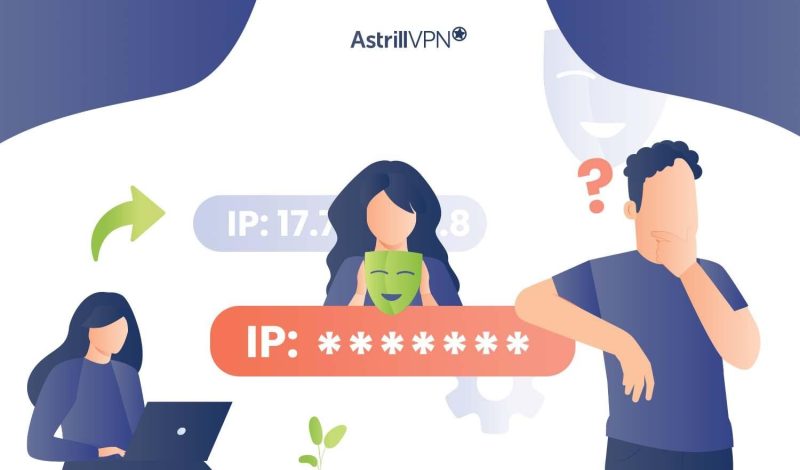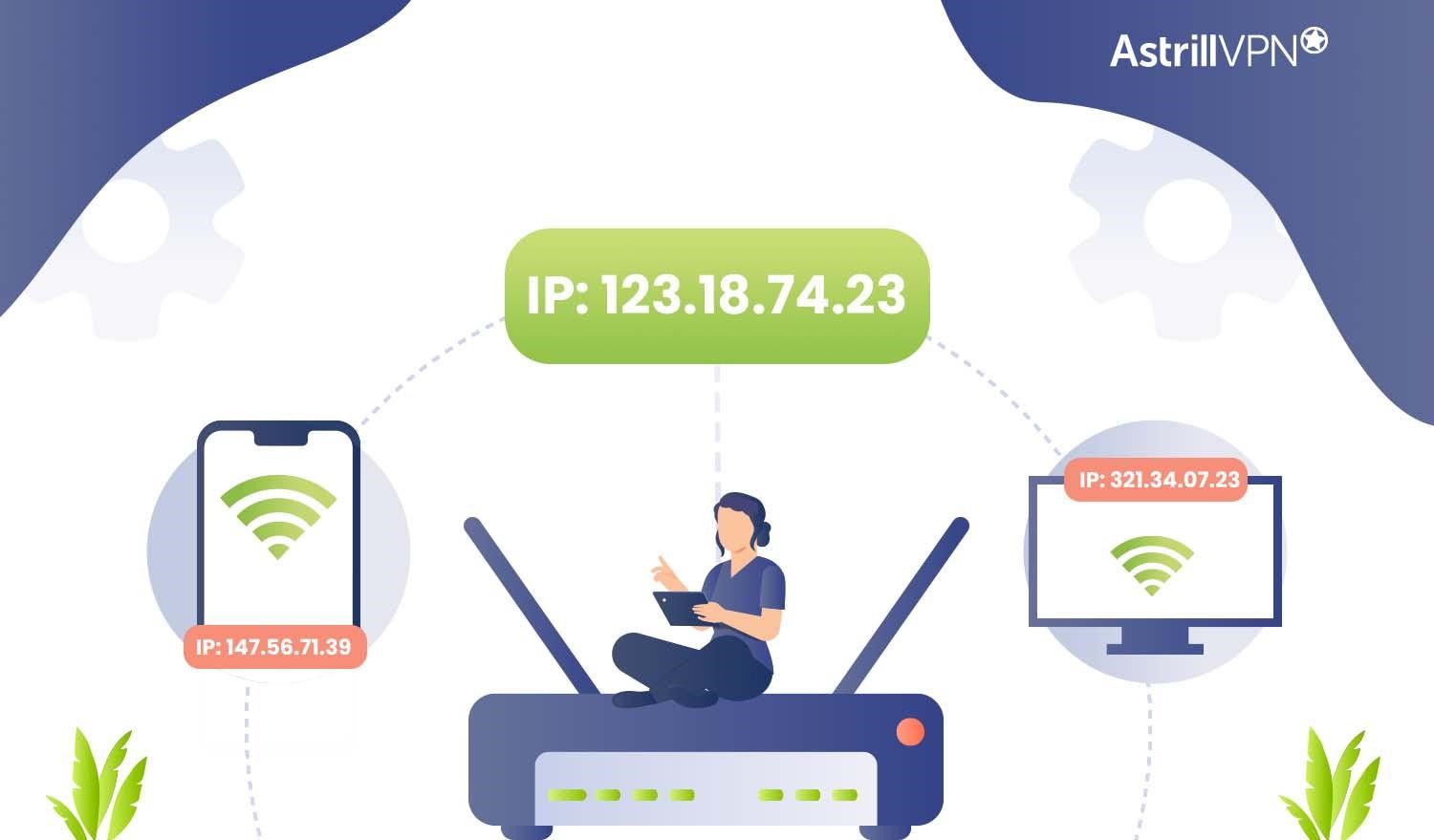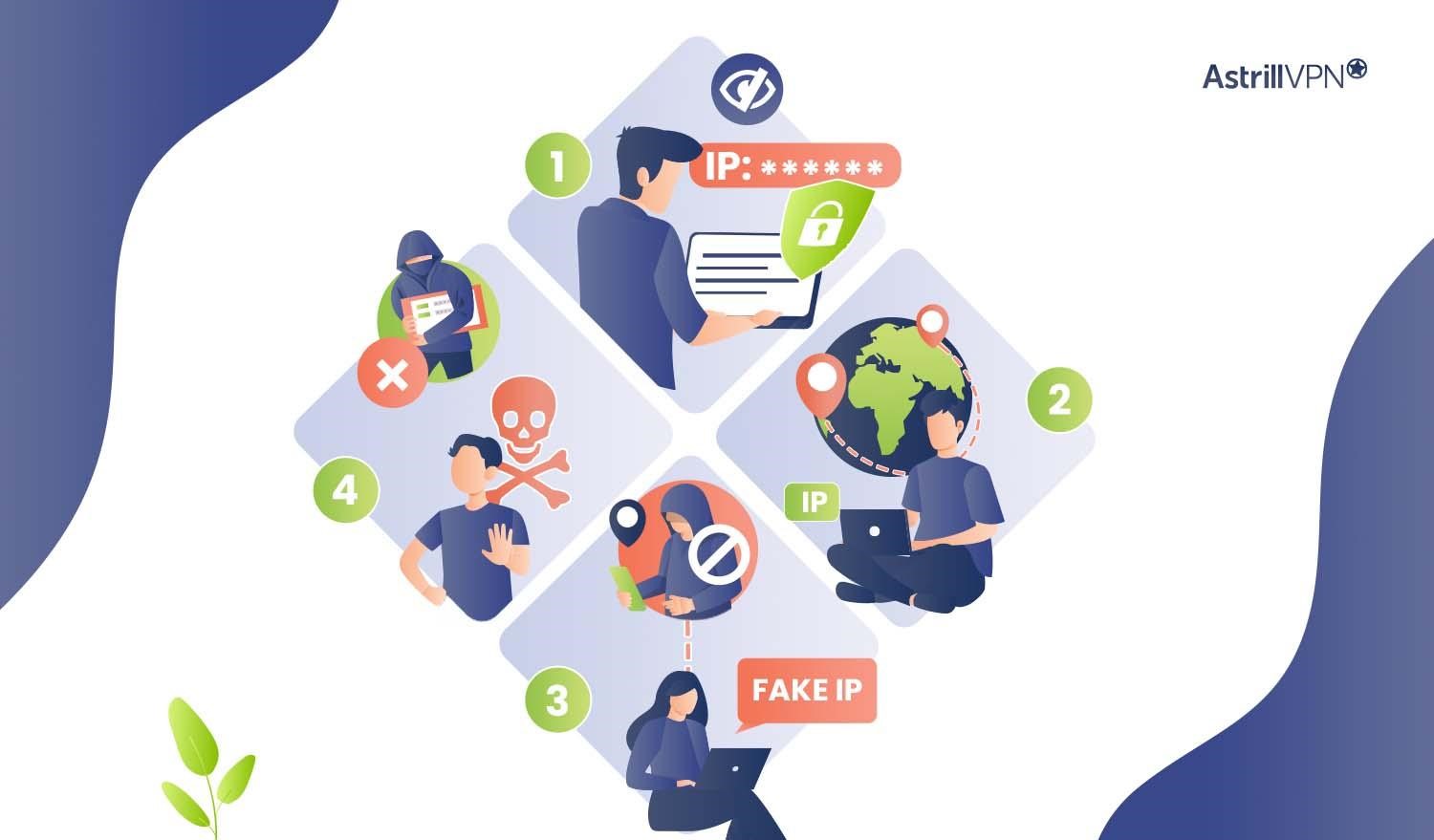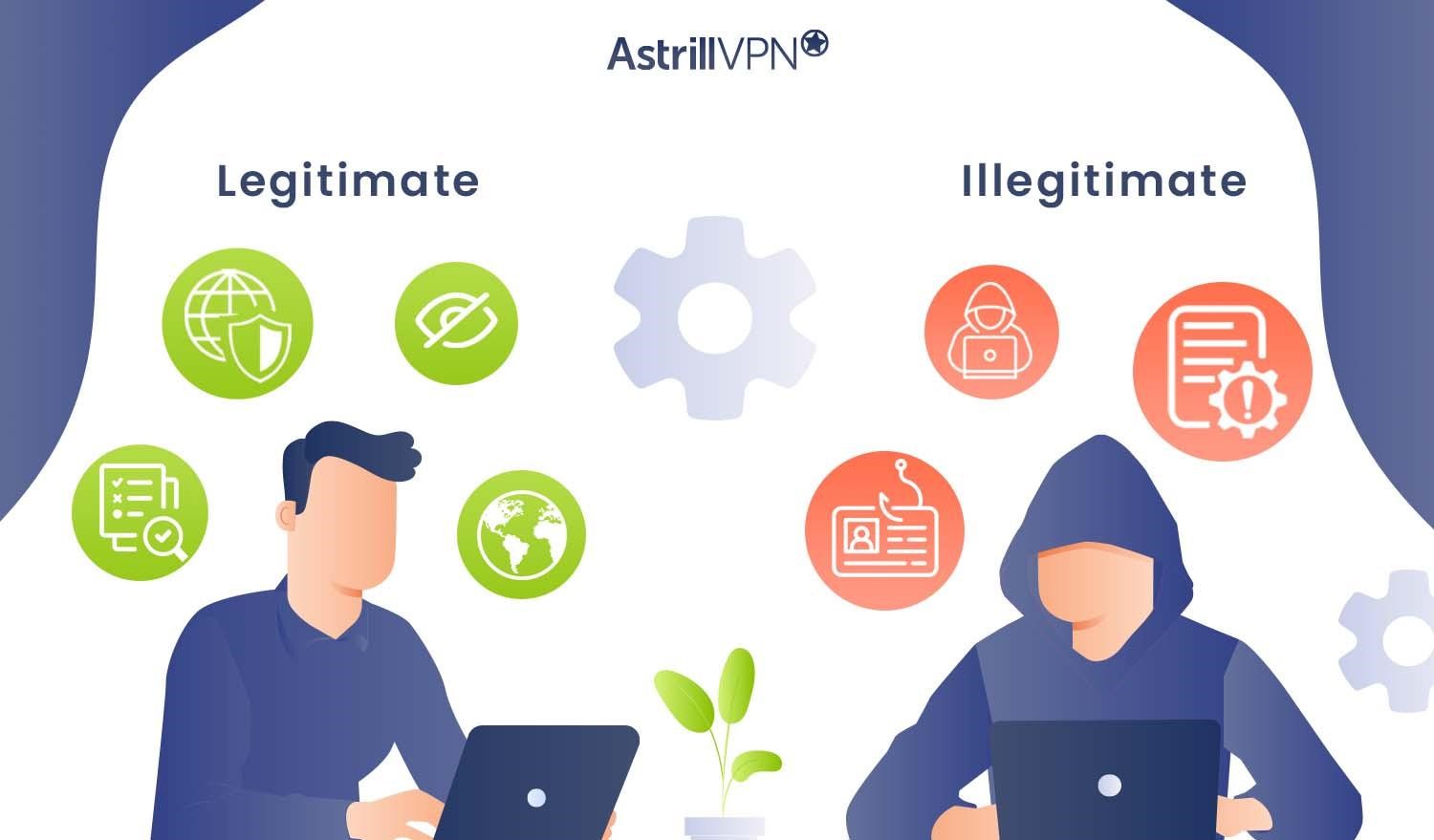What is a Fake IP Address and Should I Get One?

Arsalan Rathore

Every internet user leaves a digital footprint that can be traced, monitored, and exploited. Our IP address, a unique identifier assigned to every device connected to the web, plays a pivotal role in this process.
Faking an IP address is one of the best ways to be anonymous online, but this phenomenon can be used for legitimate and illegal purposes. Follow this guide to learn what a fake IP address is, how to get it, and the legal implications.
Table of Contents
How IP Addresses Work

IP addresses are fundamental components of the Internet. They serve as unique identifiers for devices on a network, allowing data to be routed to and from the correct destinations. IP addresses are essential for the functioning of the internet and play a crucial role in the communication between devices.
Every device connected to the internet, whether a computer, smartphone, or server, is assigned a unique IP address. This address is necessary for distinguishing one device from another on the vast internet network.
When you send or receive data over the internet, it’s broken down into packets. These packets contain information, including the destination IP address. Routers and switches along the way use this information to determine the path the data should take to reach its intended destination.
IP addresses can also provide information about the device’s or server’s location. This feature is commonly used for purposes like delivering localized content and targeting advertising to specific regions.
What is a fake IP address?
A fake IP address, also known as a spoofed or forged IP address, is a manipulated or concealed numerical label that makes it appear that a device is using an IP address different from its actual one. This is often done to disguise the device’s or user’s identity and location.
A fake IP address is a digital disguise employed for various purposes, including online privacy, bypassing geographical restrictions, enhancing security, or even circumventing censorship.
By using a fake IP address, an individual or device can appear to connect from a different location or network, making it more challenging for websites, online services, and even potential trackers to determine their actual whereabouts or identity accurately.
It’s a way of maintaining online anonymity or accessing content and services that might otherwise be restricted based on geographical location.
Why Should You Use a Fake IP Address?

There are several reasons why you should use a Fake IP address:
1. Privacy and Anonymity
The desire for online privacy and anonymity is one of the primary reasons individuals opt to use fake IP addresses. When you browse the internet, your IP address can reveal your geographical location and, in some cases, even your identity.
Using a fake IP address helps maintain your online privacy by obscuring your location and making it more challenging for websites, advertisers, and government entities to track your online activities.
Whether you’re concerned about targeted advertising, government surveillance, or simply value your digital privacy, a fake IP address can be a valuable tool for safeguarding your anonymity.
2. Bypassing Geographical Restrictions
Many online services, such as streaming platforms, websites, and content providers, impose geographical restrictions on their content. This means that users in one region may need more access to certain services or content libraries readily available in other areas.
By using a fake IP address, individuals can effectively circumvent these restrictions by making it appear that they are accessing the content from a different location. This practice, often called geo-spoofing, enables users to enjoy a broader range of online services and content, regardless of location.
3. Avoiding Online Tracking
Online tracking, which can be invasive and intrusive, is a common concern for many internet users. Websites, advertisers, and data brokers often collect data on your online behavior and preferences to deliver targeted advertisements.
By cloaking your IP address with a fake one, you can make it more challenging for these entities to track your activities and build a detailed profile of your online behavior. This is a proactive step in reclaiming control over your digital footprint and reducing the amount of personal data collected about you.
4. Protection from Cyber Threats
The internet is not without its dangers, and using a fake IP address can serve as a layer of protection against specific cyber threats. For instance, when conducting online transactions or communicating sensitive information, a fake IP address can make it harder for potential attackers to pinpoint your location or access your personal data.
Individuals may sometimes use fake IP addresses to create a digital “smokescreen” that confuses attackers, potentially deterring cyberattacks, such as distributed denial of service (DDoS) attacks.
Disadvantages of using a fake IP address
As with any tool, the use of fake IP addresses carries certain disadvantages and potential risks that you should be aware of:
- Legal Implications: Using a fake IP address to engage in illegal activities, such as hacking or cybercrime, can lead to legal consequences. Laws vary by jurisdiction, and unauthorized use of fake IP addresses can result in criminal charges.
- Ethical Concerns: Misusing fake IP addresses for fraud, such as identity theft or financial scams, raises ethical dilemmas. Responsible online behavior is crucial to maintaining trust and digital safety.
- Service Violations: Some online platforms and services explicitly forbid using fake IP addresses in their terms of service. Violating these terms may lead to the suspension or termination of your account.
- False Sense of Security: Fake IP addresses can enhance online security but are not foolproof. They can provide a layer of protection, but they should be used with other security measures for comprehensive defense against cyber threats.
- Ineffectiveness with IPv6: With the transition to IPv6, which provides an abundance of unique IP addresses, the effectiveness of using fake IP addresses for privacy and anonymity may diminish.
- Complexity and Technical Challenges: Setting up and configuring fake IP addresses through proxies, VPNs, or other methods can be technically challenging for some users. It may also involve additional costs if you opt for premium services.
How to Get a Fake IP Address?
Here are five common methods for faking an IP address:
1. Proxy Servers
Proxy servers act as intermediaries between your device and the internet. By connecting through a proxy server, you can effectively change your real IP address and assume the IP address of the proxy server. Here’s how it works:
- Choose a reputable proxy server service.
- Configure your device or internet application to use the proxy server.
- When you access websites or online services, your requests pass through the proxy server, which then communicates with the destination servers on your behalf, making it appear that the requests are coming from the proxy server’s IP address.
Proxy servers come in various types, including HTTP proxies, SOCKS proxies, and transparent proxies, each suited for different purposes. Be aware that the anonymity level of proxy servers can vary, and some may log your activities.
2. VPNs
VPNs are highly reliable for faking your IP address. When you use a VPN, your internet traffic is securely routed through a server in a different region or country. This server acts as an intermediary, hiding your IP address and providing a temporary, alternate one.
Use AstrillVPN to fake your IP address through its highly secure VPN servers in over 50 countries. By substituting your IP address with one from the AstrillVPN server, you can shield your true identity from websites, advertisers, and government agencies.
Also, When you connect to a VPN server in a different location, it appears your internet traffic originates from that region. This capability empowers users to access content that might otherwise be restricted due to geographical limitations.
3. Tor Network
The Tor (The Onion Router) network is designed for anonymity and privacy. It routes your internet traffic through a series of volunteer-operated nodes, making it extremely difficult to trace your online activities to your IP address.
Tor is particularly useful for individuals who require strong anonymity online, but it can be slower than other methods due to the number of nodes your traffic passes through.
4. IP Spoofing
IP spoofing involves manipulating the source IP address in data packets to make it appear as if they originate from a different location or device. While this method is technically possible, it is mainly used in cybersecurity for testing and defense against DDoS attacks. However, it is only practical for some users and is generally discouraged for unethical purposes.
5. Using Public Wi-Fi
This may sound odd, and some people may be confused; how can you fake an IP address by connecting to a public Wi-Fi network? But in reality, you can!
Connecting to public Wi-Fi, such as coffee shops or airports, can temporarily fake your IP address. However, this change is limited to the network’s IP address pool and does not provide the same anonymity or control as other methods.
Public Wi-Fi connections may have security risks, so using them cautiously and considering additional security measures is essential.
Legitimate vs. Illegitimate Uses of Fake IP Addresses

The use of fake IP addresses is a practice that spans a broad spectrum of legality and ethics, depending on the intentions and consequences of such use. It’s crucial to distinguish between legitimate and illegitimate applications of fake IP addresses to ensure responsible online behavior. Here’s an in-depth look at these categories:
Legitimate Uses
1. Online Privacy and Anonymity
Using a fake IP address to protect your online privacy and anonymity is generally considered legitimate and ethical. It allows individuals to shield their real identity and location from websites, advertisers, and potentially intrusive governmental surveillance.
2. Bypassing Geographical Restrictions
Employing fake IP addresses to access content or services restricted in your region is legitimate use. This is often used to enjoy a broader range of online content, such as streaming services or news websites.
3. Enhancing Online Security
Using fake IP addresses as a part of a broader security strategy to protect against cyber threats, such as distributed denial of service (DDoS) attacks, is a responsible and ethical application. It can help safeguard individuals and organizations from online risks.
4. Testing and Development
In web development and IT, simulating different network environments with fake IP addresses is a legitimate practice. It ensures that websites and applications work effectively under various conditions and for a diverse global audience.
Illegitimate Uses
1. Hacking and Cybercrime
Utilizing fake IP addresses for hacking, spreading malware, or engaging in other cybercrime forms is illegitimate and unethical. These activities can cause significant harm and are punishable by law.
- Fraud and Identity Theft
Employing fake IP addresses to conduct fraudulent activities, identity theft, or financial scams breaches ethical and legal standards. Such actions harm individuals and organizations and are considered unlawful.
3. Violation of Service Terms
If you use fake IP addresses to breach the terms of service of online platforms, this is an unethical practice. It undermines trust and the integrity of online communities and services.
Gray Areas
There are instances where the ethical and legal aspects of using fake IP addresses are not straightforward. These “gray areas” often depend on the specific context and intentions of the user. Here are a few examples:
- Commercial VPN Services: Some commercial VPN services claim to offer privacy and anonymity but may log user data or have unclear data usage policies. This blurs the line between legitimate and questionable practices.
- Dynamic IP Addresses: Internet service providers (ISPs) often assign dynamic IP addresses, which change periodically. It can sometimes appear that users employ fake IP addresses when not intentionally doing so.
- Testing and Development: Testing applications and websites with fake IP addresses are generally legitimate but may raise concerns if the testing involves unauthorized access to data or systems.
How to Detect a Fake IP Address
Detecting a fake IP address is essential for various online security and compliance purposes. While it may not be foolproof, several methods and techniques can help identify when an IP address is likely fake. Here are common approaches to detecting fake IP addresses:
1. Geolocation Data
One of the initial indicators of a fake IP address is a discrepancy between the claimed and actual physical locations. Geolocation databases provide information about the estimated geographical location of an IP address. If the claimed location does not match the known location of the IP, it could be a sign of deception.
2. Anomaly Detection
Anomalies in network traffic can indicate the use of a fake IP address. Network monitoring tools can help identify unusual patterns, such as a sudden spike in traffic from a single IP address. This may suggest an attempt to disrupt services or engage in malicious activity.
3. IP Reputation Services
Some online services and databases track the reputation of IP addresses based on their historical behavior. If an IP address is associated with a poor reputation, it might indicate suspicious activity. Security tools often use these services to block or flag IP addresses with a bad reputation.
4. Behavior Analysis
Monitoring the behavior of an IP address can be a valuable method for detecting fakes. For example, suppose an IP address repeatedly tries to access restricted website areas or exhibits other unusual behavior patterns. In that case, it may be a fake IP or a potential threat.
5. Rate Limiting
It is a technique where the number of requests or connections from a single IP address is restricted. When a fake IP address attempts to access a service, it may trigger rate limiting as it exhibits unusual behavior or makes excessive requests in a short period.
6. Proxy or VPN Detection
Proxy and VPN detection tools can help identify when an IP address is associated with a known proxy or VPN service. While these services can be used legitimately, their usage may raise concerns if they attempt to conceal the IP address.
7. Reverse DNS Lookups
Performing a reverse DNS lookup on an IP address can reveal the associated domain name. If the domain name does not align with the expected domain for the IP range, it could be a sign of a fake IP address.
8. Traffic Analysis
In-depth traffic analysis can help detect fake IP addresses. Intrusion detection systems (IDS) and intrusion prevention systems (IPS) can analyze packets for signs of malicious intent. This includes recognizing the use of known fake IP addresses in attack patterns.
9. Human Interaction
Sometimes, human interaction is the best way to detect a fake IP address. Users or administrators may notice unusual behavior, irregular access patterns, or suspicious requests that lead them to investigate further.
10. Consult Logs and Analytics
Reviewing server logs and analytics data can reveal inconsistencies in IP addresses and user behavior. Anomalies or repeated access attempts from a single IP address can indicate a fake IP address.
Why You Should Avoid Free Proxies To Get a Fake IP Address
While using a proxy server is a legitimate method to fake your IP address, relying on free proxies often comes with various risks and drawbacks that can compromise your online privacy and security. Here are why you should be cautious when considering free proxies:
1. Lack of Reliability
Free proxies are typically run by individuals or organizations offering their servers for public use. These proxies are often unreliable since they need more resources and incentives to maintain high-quality services. They may be slow, frequently down, or unavailable when needed.
2. Security Concerns
Free proxies are a prime target for cybercriminals looking to intercept and manipulate traffic. There is no guarantee that your proxy server is secure, and some may log your data or inject malicious scripts into your web traffic.
3. Privacy Risks
When you use a free proxy, you are essentially trusting the operator of that proxy with your data. They may monitor your online activities, collect personal information, or sell your data to third parties. This can severely undermine your online privacy.
4. Limited Anonymity
Free proxies may not provide the level of anonymity you expect. Your data may still be exposed, as free proxy operators may not implement robust privacy measures.
5. Geographical Restrictions
Free proxies may only sometimes be located in your desired region, making it challenging to bypass geographical restrictions or access region-specific content reliably.
6. Ads and Pop-ups
Many free proxies sustain themselves by displaying advertisements, which can be annoying and potentially unsafe. These ads can also slow down your browsing experience.
7. Bandwidth Limitations
Free proxies often impose bandwidth restrictions, leading to slower internet speeds and a less responsive online experience.
8. No Support or Maintenance
When issues arise with a free proxy, you may need more access to customer support. There needs to be someone to turn to when problems occur.
9. Unpredictable Server Quality
The hardware and software infrastructure of free proxies may need to be updated, resulting in a subpar user experience. Regular maintenance and updates are often lacking.
10. Abuse by Malicious Users
Free proxies are attractive targets for malicious users, who may abuse them for illegal activities, such as cyberattacks. If the proxy server is investigated for criminal activity, this could put you at risk.
Can I manually create a fake IP?
Creating a fake IP address manually is a complex and highly technical process impractical or recommended for the average user. Manipulating your IP address to impersonate another IP address can involve illegal activities, and attempting to do so without proper authorization can have serious legal consequences.
IP spoofing involves changing the source IP address in network packets and is often used in cybersecurity for specific purposes like penetration testing. However, it requires advanced networking protocols and systems knowledge and is strictly controlled and regulated within lawful and ethical frameworks.
FAQs
An example of an invalid IP address is 256.1.1.1. IP addresses consist of four numbers separated by periods, each ranging from 0 to 255. An address like 256.1.1.1 exceeds the valid range, making it invalid.
Yes, a VPN can give you a fake IP address. When you connect to a VPN server, it routes your internet traffic through that server and assigns you an alternate IP address, effectively cloaking your real one.
“Ghosting” an IP address isn’t a common term in networking or cybersecurity. If you mean changing or hiding your IP address, then yes, methods like using VPNs or proxy servers can help you achieve this.
Yes, your phone’s IP address can be traced. IP addresses are used to identify devices on the internet.
A hidden IP address, such as one changed by a VPN or proxy, can be challenging to trace back to the originating user.
Private browsing, such as “Incognito” mode in web browsers, doesn’t hide your IP address. It only prevents the browser from storing your browsing history and cookies locally.

No comments were posted yet